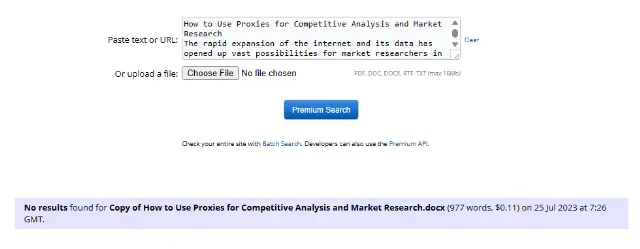The rapid expansion of the internet and its data has opened up vast possibilities for market researchers in various sectors and industries. Using proxies for market research can be a great idea. For example, if you need to do research on the German market, you can benefit from using a Germany proxy: and so on.
Organizations are now adopting data-driven marketing strategies to gain a competitive edge, and data extraction methods have become their preferred tools.
Simply put — having more data in market research translates to a stronger competitive advantage. While traditional market research reports with compiled information remain valuable, a recent study by Forrester Research, Inc. reveals that businesses directly involved in data mining enjoy a considerable advantage, with an annual growth rate of over 30% and projected earnings of $1.8 trillion by 2021.
McKinsey's research also supports these findings, showing that companies that harness customer data outperform their industry peers by an impressive 85% sales growth and over 25% gross margin.
So how to use proxies to do market research and competitive analysis?
Insights Unveiled: Empowering Market Research through Data Analysis
Undeniably, data plays a pivotal role in today's landscape. However, an overwhelming influx of information comes with the internet's exponential growth. Conventional market research approaches can prove time-consuming, and navigating the data clutter becomes tedious and costly.
Fortunately, the remedy lies in web scraping.
Discreet web scraping methods through proxies are key to gathering pertinent data, enabling you to focus precisely on your target market. This article will comprehensively understand how web scraping operates, its practical applications, and the most efficient and anonymous means of obtaining the market research data you require.
Competitive Analysis and Market Research: Why Do It?
Market research and competitive analysis provide vital insights into your market and business landscape, enabling you to understand and connect with customer perceptions. It helps you assess your competition and plan your business strategy. Moreover, market research informs product development, identifies target customers, reveals customer opinions, and gauges market potential, guiding smart packaging, promotion, and marketing decisions.
The Fundamentals of Web Scraping for Market Research & Competitive Analysis
To kick off, web scraping involves the extraction of data from websites.
A straightforward illustration would be a webpage brimming with clothing items showcasing prices, colors, and sizes. Scraping, or "harvesting," this data can range from manually inputting the information into a spreadsheet through copying and pasting to a more intricate process involving a custom-programmed application that automatically downloads and organizes vast volumes of data from hundreds or even thousands of pages.
The advanced web scraping technique transforms market research by efficiently aggregating, organizing, and processing substantial data sets at remarkable speeds. This empowers marketers with profound insights into large populations, revolutionizing their market understanding.
Innovative Approaches to Market Research & Competitive Analysis
Conventional market research & competitive analysis techniques encompass laborious and costly methods such as surveys, focus groups, interviews, and field experiments. In contrast, web scraping harnesses the vast reservoir of internet data, providing marketers a streamlined means to efficiently segment and analyze their target markets.
Among the strategies for market research are:
- Sales and marketing. Web scraping may assist with lead generation, interest analysis, and rating extraction from many platforms for tracking customer sentiment.
- Analyzing Prices. The seemingly infinite array of products available on the web from various corners of the globe can complicate pricing analysis. However, web scraping offers a valuable solution by enabling companies to extract competitor prices and keep a vigilant eye on their actions, including discounts, new product launches, and other essential competitive product details.
- Brand Management. Because of the web's transparency, bad news spreads quickly. Web scraping may gather data on product mentions, including ratings, which offers businesses early warning of negative feedback and allows them to take action before their brand is harmed.
Following these strategies, you can dig out “hidden-in-plain-sight” knowledge and insights nuggets.
How to Scrape Websites
Web scraping methods come in various forms, each differing in effectiveness, coding intricacy, expenses, and upkeep.
As discussed earlier, the most straightforward technique involves manual copying and pasting. At the same time, the most advanced options encompass diverse programming-based approaches such as text-pattern matching, database extraction, utilizing the DOM (Document Object Model), or creating automated bots.
Additionally, other web scraping methods utilize software tools that attempt to comprehend a page's data structure, presenting an automated recording interface to eliminate the need for manual code writing. Alternatively, scripting functions can extract and transform content, or specific functions can directly retrieve data from an API.
Leveraging Proxies in Market Research
While manually copying and pasting data into a spreadsheet is an option for market researchers, conducting web scraping on a substantial scale from extensive websites necessitates using proxies to evade potential bans or blocks.
In essence, a proxy serves as an intermediary server provided by a company, enabling users to channel their requests through these servers, thereby concealing the user's actual address from the website receiving the request.
This grants web scrapers the ability to mine website data without the risk of being banned or blocked. Moreover, proxies enable the concealment of the scraper's specific geographical location and the type of device they are using.
Concluding Remarks
In digital marketing and internet advertising, web scraping is paramount for gaining valuable insights. However, the endeavor to harvest extensive data poses certain hurdles. To overcome these challenges, proxies prove to be a highly effective solution, circumventing the roadblocks set up by site administrators.
While residential proxies, like German proxies, may come with a higher price tag than other options, their value justifies the investment. They streamline your web scraping operations by providing access to authentic IP addresses and granting entry to essential competitor and market data.
All in all, web scraping applications can seamlessly collect vital data to fuel precision-driven marketing strategies and competitive analysis using German proxies.





